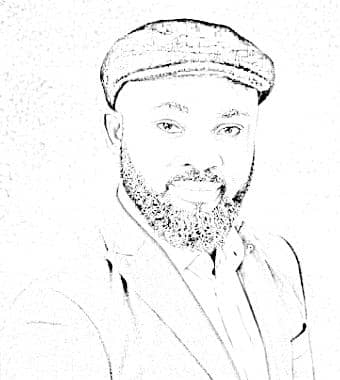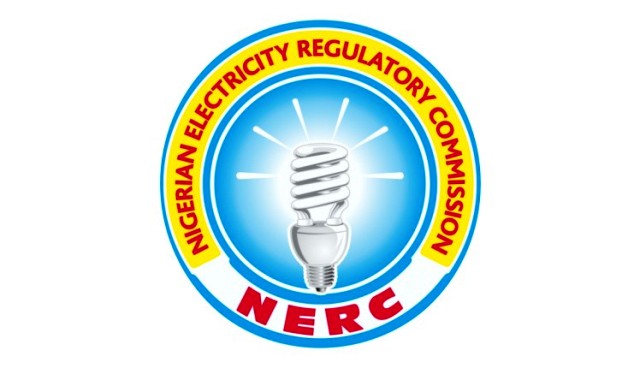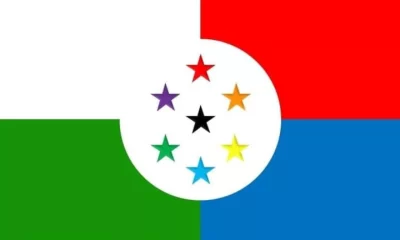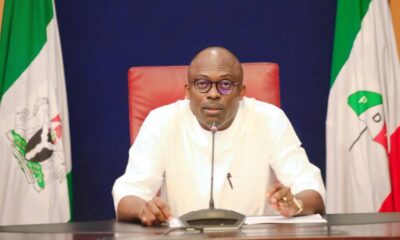Opinion
The Riddle Of The “And”

It is now more than a month since the 2023 presidential election.
The election has been won and lost, and the certificate of return has been given to the winner, Bola Armed Tinubu of the All Progressives Congress (APC). The date of inauguration of the new government has already been fixed for May 29, 2023, in line with the nation’s evolving democratic tradition. In preparation for this epoch- making event, the victor of February 25, 2023, jetted off to France for a well deserved rest after spending time in the political trench. It won’t be out of place to also assume that Nigeria’s president- elect spent the time to drink deep from the fountain of wisdom in order to lead the largest black nation on earth, with its numerous ethnic groups, gapping religious and tribal fault lines, and intractable security situation.
The pulse of the nation indicates an uneasy calm, but it is certain, at least from the utterances of the Peoples Democratic Party (PDP) flag bearer, Atiku Abubarkar, and his Labour Party counterpart, Peter Obi, that there won’t be any major protest in the likes of the 2020 #EndSARS protest that brought the nation to its knees. Nevertheless, the unusual calm is a prelude to imminent legal fireworks, the likes the nation has never witnessed before. Already, the first runner up, Atiku Abubarkar of the PDP, and third place Peter Obi of the Labour Party have set the stage by filing their petitions at the presidential elections tribunal sitting in Abuja.The petition of the Labour Party and its candidate has five prayers; however, the second prayer is of particular interest in this discuss, and it reads as follows: “That it be determined that the 2nd Respondent having failed to score one-quarter of the votes cast at the Presidential election in the Federal Capital Territory, Abuja, was not entitled to be declared and returned as the winner of the Presidential election held on 25th February 2023.”
It is clear that the impetus for this second prayer derives from Section 134(2) of the Constitution of the Federal Republic of Nigeria, 1999 (as amended), and particularly sub-paragraph (b) which provides that: “ A candidate for an election to the office of the President shall be deemed to have been duly elected where, there being more than two candidates for the election – (a) he has the highest number of votes cast at the election; and (b) he has not less than one-quarter of the votes cast at the election in each of at least two-thirds of all the States in the Federation and the Federal Capital Territory, Abuja.”It is very surprising, but in any case, very interesting that the conjunction ‘and’ has been at the centre of the argument even before the President -elect was announced. In a very funny way, the ‘and’ puzzle reminds me of the case of the blind men and the elephant. For one, the animal was a long tail, for another it was a tux, yet for another, it was a very large ear, and so on. However, the elephant in this case is the constitution, and there are no blind men, rather learned men who go by the highly exalted title: Senior Advocate of Nigeria (SAN) – and they are poised to put multifarious explanations to flight.
The law has no emotions, but we can be rest assured that the legal luminaries on both sides of the isle are set to make the elephant dance. But before the real fireworks begin, some of the renowned legal minds of our time are already thrilling anxious Nigerians with their own interpretation of Section 134(2) of the Constitution of the Federal Republic of Nigeria, 1999 (as amended), particularly sub-paragraph (b) which is the bone of contention. Most of them have been on TV and other platforms recently to help unlearned men like me make sense of the import of the conjunction ‘and’ as it is used in this particular statement: “he has not less than one-quarter of the votes cast at the election in each of at least two-thirds of all the States in the Federation and the Federal Capital Territory, Abuja.”In their argument regarding this portion of the constitution, there is a point of convergence; however, there is also a sticky point of departure where the mathematics of the Constitution pitched them in diametrically opposed positions.
They are all in agreement, that Section 299(1) of the Constitution, which provides that the provisions of the Constitution shall apply to the Federal Capital Territory (FCT), as if it were one of the States of the Federation, with the implication that even though the FCT is not a state in the real sense, it is regarded as the 37th state.
For instance, Femi Falana, SAN, argues that by the combined effect of Sections 134 and 299 of the Constitution, a candidate shall be deemed to have won the Presidential election if he scores the highest number of lawful votes cast at the election, and 25% of lawful votes in 37 States or 36 States plus the FCT – stating that it is not compulsory, for a Presidential candidate to win the FCT. In fact, he went further to state that the FCT, is not the Electoral College of the Federal Republic of Nigeria. In support of this position, Professor Taiwo Osipitan, SAN, inferring from myriad legal precedence averred that that the FCT is part of the two-third spread contemplated in Section 134 of the 1999 Constitution.
With the intent that a candidate who has the highest number of votes and satisfies the 25% spread in not less than two-thirds of the States including FCT, is entitled to be declared the winner of the election, irrespective of the percentage of votes scored in the total votes cast in FCT.
Interestingly, and in line with the position that it is not compulsory for a presidential candidate to Win 25% of the votes at the FCT, Aikhunegbe Anthony Malik, SAN, argued that those who are offering an alternative interpretation of Section 132 (2) of the constitution to the effect that acquiring 25% of votes in the FCT is a compulsory requirement to be declared winner seem to overlook the essence, or significance of the conjunctive word ‘and’ employed therein. According to him, whenever the word ‘and’ is employed in law, “it denotes a conjunctive, and never a disjunctive meaning.”
Unfortunately, the above arguments are not caste and dry, because legal heavy weights like the former President of the Nigerian Bar Association, Dr. Olisa Agbakogba, SAN and Chief Mike Ozekhome CON, SAN, contend that, for a candidate to be declared winner of the presidential election it is imperative that he or she must acquire at least 25% of the votes cast in the FCT.
In his argument, Dr. Agbakogba opined that the literal interpretation of this section of the constitution is that a candidate must secure 25% of votes cast in 2/3rd of the entire 36 States of Nigeria and 1/4th (25%) of votes cast in FCT. According to him, the provision is clear, direct and unambiguous, such that you don’t need a Professor of Constitutional Law to comprehend.
He further maintained that the use of the word “and” had been held by the Supreme Court to be conjunctive, which implies that the conditions in Section 134(2)(b) are conjunctive and mandatory. Therein lay the riddle, because, Aikhunegbe Anthony Malik, SAN supported his argument with the conjunctive use of ‘and’ when employed in the constitution, as opposed to being disjunctive, but he arrived at a different conclusion. Similarly, even though Section 299 of the constitution formed a critical part of both arguments (which states that the FCT is to be treated as a State in Nigeria), Dr. Agbakogba posits that it is a general provision that has no bearing on Section 134. Hence, he concludes therefore that A general provision cannot override a specific provision – implying that since Section 134(2)(b) is a specific provision on the conditions for declaration of a candidate and the presidential winner at the polls, with the result of the general elections as published by INEC, the contest is still open, as none of the candidates has satisfied the legal threshold in Section 134.
Lastly, Chief Ozekhome has also asserted that by a judicial mathematical analysis, 2/3 of 36 States is equal to 24 States, and in addition, the FCT, Abuja. To buttress his position, he gave this analogy: “if I request to see 24 Corpers in my law firm And Okon, it means I want to see 25 persons in all; but Okon must be one of the 25 persons. So, if 25 persons in my law firm show up, without Okon, have I had all the persons I want to see? The answer is No. To satisfy my request, Okon must show up in addition to the 24, thus, making the 25 persons I desire to see. According to him, the jurisprudence behind this provision is to ensure that the President as the number one citizen of the Nation enjoys a widespread acceptance by majority of the people he seeks to govern, including those inhabiting the seat of power where he would govern from. Evidently, the letter of the law is the same, and available all, some interpretations are the same, yet renown legal pundits have arrived at different conclusion, thereby setting the stage for an interesting legal fireworks that promises to put this matter to rest once and for all when the Supreme court makes its pronouncement.
Nigerians are eagerly waiting for the legal fireworks to begin; the petitioners, namely Atiku Abubarka and the PDP, and Peter Obi and the Labour Party are ready. The President Elect and APC should be getting ready, we believe; but while Nigerians are unaware of the size of the war chest the President Elect and his party are putting together to defend their mandate, the Independent National Electoral Commission (INEC) has come out to tell Nigerians that after spending more than N300 billion to conduct the 2023 general elections, it has now allotted another N3 billion to defends its declared results. As you can imagine, the Nigerians are about to witness a legal clash of the Titans. Let it begin.
By: Raphael Pepple
Opinion
Betrayal: Vice Of Indelible Scar
The line that separates betrayal and corruption is very thin. Betrayal and corruption are two sides of the same coin. Like the snail and its shell they are almost inseparable. They go hand-in-globe. Betrayal and corruption are instinctive in humans and they are birthed by people with inordinate ambition – people without principles, without regard for ethical standards and values. Looking back to the days of Jesus Christ, one of his high profile disciples-the treasurer, was a betrayer. Judas Iscariot betrayed Jesus Christ for just 30 pieces of silver. One of the characteristics of betrayers is greed.
So, when on resumption from his imposed suspension, the Rivers State Governor, Sir Siminilayi Fubara threatened to bring permanent secretaries who were found complicit in “defrauding” the State during the days of Locust and Caterpillar regime, he did not only decry a loot of the Treasury but the emotional trauma of betrayal perpetrated by those who swore to uphold the ethics of the civil service. Governor Siminilayi Fubara had least expected that those who feigned loyalty to his administration would soon become co-travellers with an alien administration whose activities were repugnant to the “Rivers First” mantra of his administration. The saying that if you want to prove the genuineness of a person’s love and loyalty feign death, finds consummate expression in the Governor Fubara and some of the key members of the State engine room
Some of those who professed love for Governor Siminilayi Fubara and Rivers State could not resist the lure and enticement of office in the dark days of Rivers State, like Judas Iscariot. Rather, they chose to identify with the locusts and the caterpillars for their selfish interest. Julius Caesar did not die from the stab of Brutus but by his emotional attachment to him, hence he exclaimed in utter disappointment, “Even you Brutus”. The wound of betrayal never heals and the scar is indelible. Unfortunately, today, because of gross moral turpitude and declension in ethical standards and values, betrayal and corruption are celebrated and rewarded. Corruption, a bane of civil/public service is sublime in betrayal. The quest to get more at the expense of the people is the root of betrayal and sabotage.
This explains why Nigeria at 65 is the World’s capital of poverty.
Nigeria is not a poor country, yet, millions are living in hunger, abject poverty and avoidable misery. What an irony. Nigeria, one of Africa’s largest economies and most populous nation is naturally endowed with 44 mineral resources, found in 500 geographical locations in commercial quantity across the country. According to Nigeria’s former Minister for Mines and Steel Development, Olamiekan Adegbite, the mineral resources include: baryte, kaolin, gymsium, feldspar, limestone, coal, bitumen, lignite, uranium, gold, cassiterite, columbite, iron ore, lead, zinc, copper, granite, laterite, sapphire, tourmaline, emerald, topaz, amethyst, gamer, etc. Nigeria has a vast uncultivated arable land even as its geographical area is approximately 923, 769 sq km (356,669 sq ml).
“This clearly demonstrates the wide mineral spectrum we are endowed with, which offers limitless opportunities along the value-chain, for job creation, revenue growth. Nigeria provides one of the highest rates of return because its minerals are closer to the suffer”, Adegbite said. Therefore, poverty in Nigeria is not the consequences of lack of resources and manpower but inequality, misappropriation, outright embezzlement, barefaced corruption that is systemic and normative in leaders and public institutions. According to the World Poverty Clock 2023, Nigeria has the awful distinction of being the world capital of poverty with about 84 million people living in extreme poverty today.
The National Bureau of Statistics (NBS) data also revealed that a total of 133 million people in Nigeria are classed as multi-dimensionally poor. Unemployment is a major challenge in the country. About 33 percent of the labour force are unable to find a job at the prevailing wage rate. About 63 percent of the population are poor because of lack of access to health, education, employment, and security. Nigeria Economic Summit Group (NESG) speculated that unemployment rate will increase to 37 percent in 2023. The implications, therefore, is increase in unemployment will translate to increase in the poverty rate. The World Bank, a Washington-based and a multi-lateral development institution, in its macro-poverty outlook for Nigeria for April 2023 projected that 13 million Nigerians will fall below the National Poverty line by 2025.
It further stated that the removal of subsidy on petroleum products without palliatives will result to 101 million people being poor in Nigeria. Statistics also show that “in 2023 nearly 12 percent of the world population of extreme poverty lived in Nigeria, considering poverty threshold at 1.90 US dollars a day”.Taking a cursory look at the Nigerian Development Update (NDU), the World Bank said “four million Nigerians were pushed into poverty between January and June 2023 and 7.1 million more will join if the removal of subsidy is not adequately managed.” These startling revelations paint a grim and bleak future for the social-economic life of the people.The alarming poverty in the country is a conspiracy of several factors, including corruption. In January, 2023 the global anti-corruption watchdog, Transparency International, in its annual corruption prospect index which ranks the perceived level of public sector corruption across 180 countries in the world says Nigeria ranked 150 among 180 in the index. Conversely, Nigeria is the 30th most corrupt nation in the ranking. It is also the capital of unemployment in the world.
Truth be told: a Government that is corruption-ridden lacks the capacity to build a vibrant economy that will provide employment for the teeming unemployed population. So crime and criminality become inevitable. No wonder, the incessant cases of violent crimes and delinquency among young people. Corruption seems to be the second nature of Nigeria as a nation . At the root of Nigerians’ poverty is the corruption cankerworm.How the nation got to this sordid economic and social precipice is the accumulation of years of corrupt practices with impunity by successive administrations. But the hardship Nigerians are experiencing gathered momentum between 2015 and 2023 and reached the climax few days after President Bola Ahmed Tinubu, who assumed power as president of Nigeria, removed the controversial petroleum subsidy. Since then, there is astronomical increase in transport fares, and prices of commodities. Living standard of most Nigerians is abysmally low, essential commodities are out of reach of the poor masses who barely eat once a day.
The Dollar to Naira exchange rate ratio at one dollar to N1,000, is the most economy-unfriendly in the annals of the history of Nigeria. The prohibitive prices of petroleum products with the attendant multi-dimensional challenges following the removal of the subsidy, has posed a nightmare better to be imagined than experienced. Inflation, has been on the increase, negatively affecting the purchasing power of low income Nigerians. Contributing to the poverty scourge is the low private investment due to.unfriendly business environment and lack of power supply, as well as low social development outcomes resulting in low productivity. The developed economies of the world are private sector-driven. So the inadequate involvement of the private sector in Nigeria’s economy, is a leading cause of unemployment which inevitably translates to poverty.
Igbiki Benibo
Opinion
Dangers Of Unchecked Growth, Ambition
In today’s fast-paced, hyper-competitive world, the pursuit of success and growth has become an all-consuming force. Individuals, organisations, and nations alike, are locked in a perpetual struggle to achieve more, earn more, and surpass their rivals. Yet, beneath this relentless drive for progress lies a silent danger—the risk of self-destruction. This perilous pattern, which I call the self-destruct trajectory, describes the path taken when ambition and growth are pursued without restraint, awareness, or moral balance. The self-destruct trajectory is fueled by an insatiable hunger for more—a mindset that glorifies endless expansion while disregarding the boundaries of ethics, sustainability, and human well-being. At first glance, it may appear to promise prosperity and achievement. After all, ambition has long been celebrated as a virtue. But when growth becomes the only goal, it mutates into obsession.
Individuals burn out, organisations lose their soul, and societies begin to fracture under the weight of their own excesses. The consequences are everywhere. People pushed beyond their limits face anxiety, exhaustion, and disconnection. Companies sacrifice employee welfare and social responsibility on the altar of profit. The entire ecosystems suffer as forests are cleared, oceans polluted, and air poisoned in the name of economic progress. The collapse of financial systems, widening income inequality, and global environmental crises are all symptoms of this same relentless, self-consuming pursuit. To understand this dynamic, one can turn to literature—and to Charles Dickens’ Oliver Twist. In one of the novel’s most haunting scenes, young Oliver, starving in the workhouse, dares to utter the words: “Please, sir, I want some more.” This simple plea encapsulates the essence of human desire—the urge for more. But it also mirrors the perilous craving that drives the self-destruct trajectory. Like Oliver, society keeps asking for “more”—more wealth, more power, more success—without considering the consequences of endless wanting.
The workhouse itself symbolises the system of constraints and boundaries that ambition often seeks to defy. Oliver’s courage to ask for more represents the daring spirit of human aspiration—but it also exposes the risk of defying limits without reflection. Mr. Bumble, the cruel overseer, obsessed with authority and control, embodies the darker forces that sustain this destructive cycle: greed, pride, and the illusion of dominance. Through this lens, Dickens’ tale becomes a timeless metaphor for the modern condition—a warning about what happens when ambition blinds compassion and growth eclipses humanity. Avoiding the self-destruct trajectory requires a radical rethinking about success. True progress should not be measured solely by accumulation, but by balance—by how growth serves people, planet, and purpose.
This calls for a more holistic approach to achievement, one that values sustainability, empathy, and integrity alongside innovation and expansion
Individuals must learn to pace their pursuit of goals, embracing rest, reflection, and meaningful relationships as part of a full life. The discipline of “enough”—knowing when to stop striving and start appreciating—can restore both mental well-being and moral clarity. Organisations, on their part, must reimagine what it means to succeed: prioritising employee welfare, practising environmental stewardship, and embedding social responsibility in the core of their mission. Governments and policymakers also play a vital role. They can champion sustainable development through laws and incentives that reward ethical practices and environmental responsibility. By investing in education, renewable energy, and equitable economic systems, they help ensure that ambition is channeled toward collective benefit rather than collective ruin.
Corporate Social Responsibility (CSR) provides a tangible pathway for this transformation. When businesses take ownership of their social and environmental impact—reducing carbon footprints, supporting local communities, and promoting fair labour—they not only strengthen society but also secure their own long-term stability. Sustainable profit is, after all, the only kind that endures. Ultimately, avoiding the self-destruct trajectory is not about rejecting ambition—it is about redefining it. Ambition must evolve from a self-centred hunger for more into a shared pursuit of the better. We must shift from growth at all costs to growth with conscience. The future will belong not to those who expand endlessly, but to those who expand wisely. By embracing restraint, compassion, and sustainability, we can break free from the cycle of self-destruction and create a new narrative—one where success uplifts rather than consumes, and where progress builds rather than burns.
In the end, the question is not whether we can grow, but whether we can grow without losing ourselves. The choice is ours: to continue along the self-destruct trajectory, or to chart a more balanced, humane, and enduring path toward greatness.
Sylvia ThankGod-Amadi
Opinion
Gridlock at the Gates

-

 News4 days ago
News4 days agoNERC Approves N28bn For Procurement Of Meters For Band A Customers
-

 News4 days ago
News4 days agoFubara Reassures Rivers People Of Completion Of PH Ring Road Project
-

 Rivers4 days ago
Rivers4 days agoWorld Food Day: Farmers Urge Collaboration For Improved Productivity
-

 Nation4 days ago
Nation4 days agoMOSIEND Hails Benibo Anabraba Appointment As Rivers SSG
-

 Rivers4 days ago
Rivers4 days agoIAUE Governing Council Chair Assures On Mandate Delivery
-

 Featured4 days ago
Featured4 days agoFubara Tasks New SSG On Honour, Service, Protection Of Rivers Interest
-
Opinion4 days ago
Dangers Of Unchecked Growth, Ambition
-

 Editorial4 days ago
Editorial4 days agoMaking Rivers’ Seaports Work

